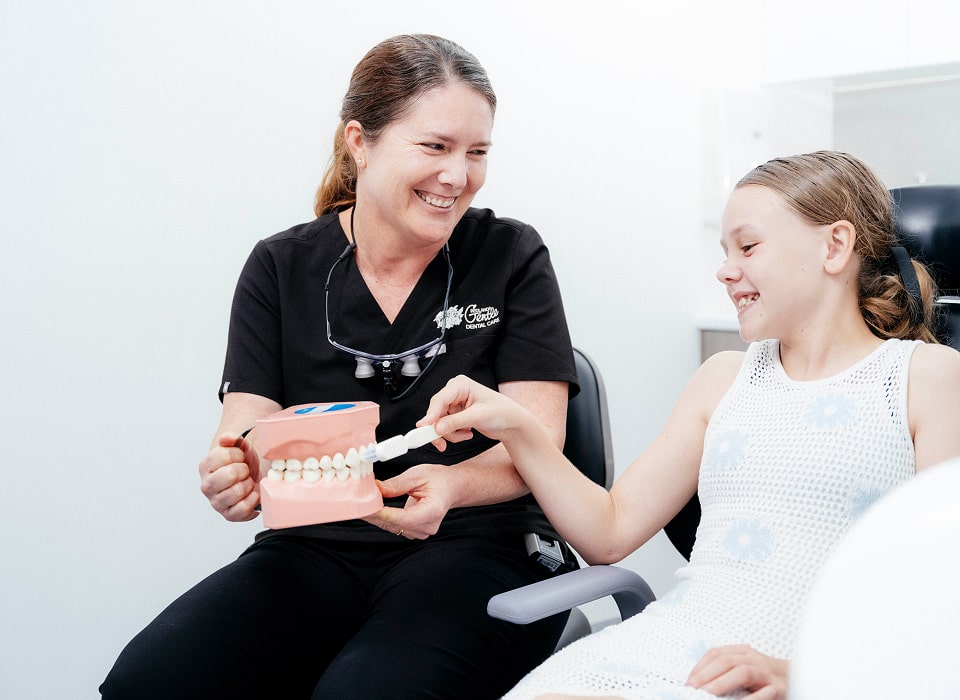Your Trusted Dentist for
Safe and Gentle
Wisdom Teeth Extraction
Why Choose Us
Choose Redlands Gentle Dental Care for Trusted and Quality Dental Care Services
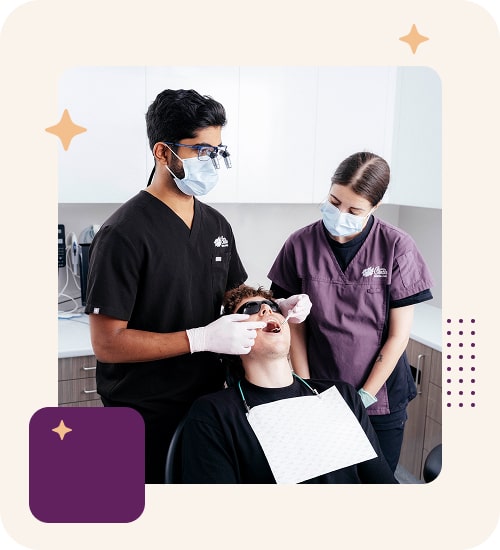
Experience Gentle, Personalised Dental Care
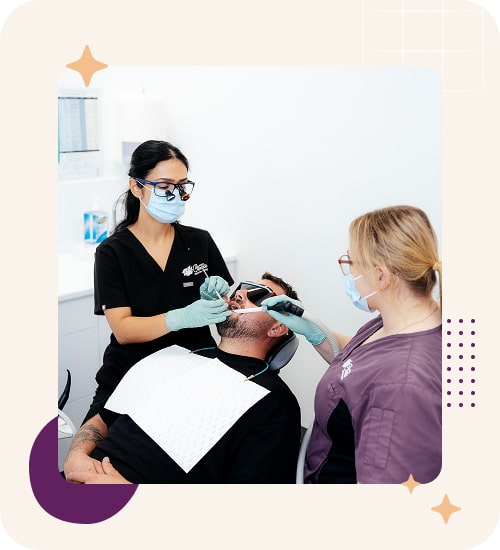
Meet Our Experienced and Empathetic Team
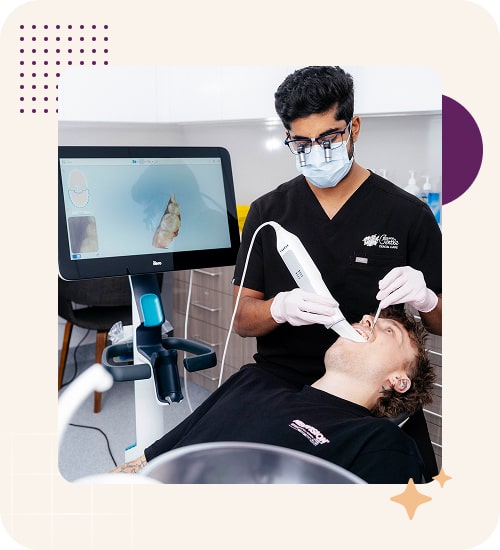
Enjoy Comprehensive Dental Services Under One Roof
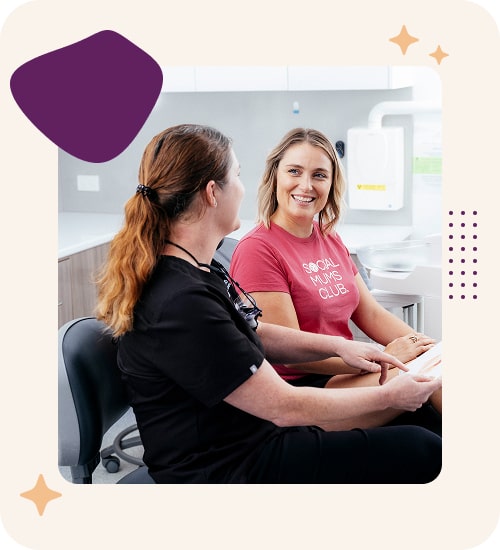
Feel at Home in Our Family-Friendly Atmosphere

Benefit from Affordable and Transparent Pricing
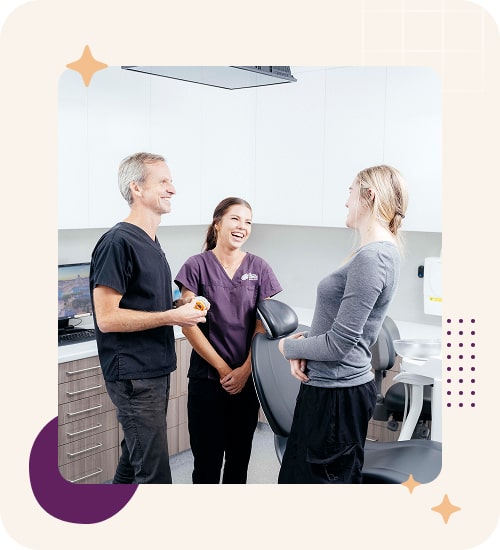
Trusted Community Pillar with 40 Years of History
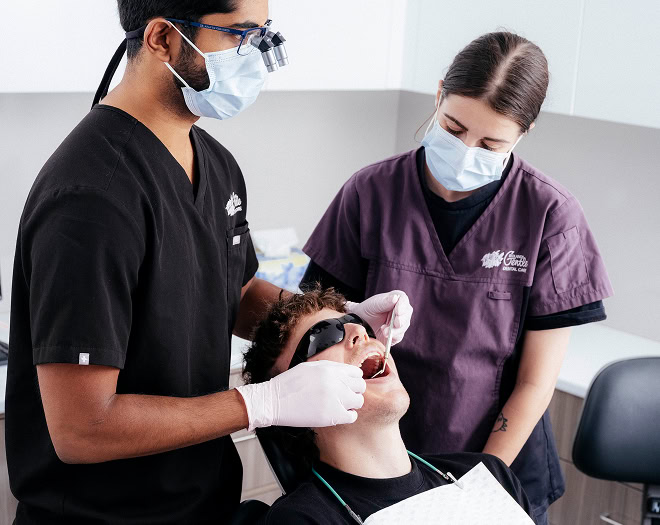
Effectively Address Pain and Protect Your Oral Health Through Wisdom Teeth Removal
Are You a Good Candidate for Wisdom Teeth Surgery?
Wisdom teeth removal is recommended for people experiencing pain, crowding, or infections. It may also be beneficial for people whose oral health is at risk. This includes cases where alignment issues arise due to impacted or problematic wisdom teeth.
- You have pain, swelling, or infection around your wisdom teeth. These symptoms suggest they’re causing complications and require removal to prevent future dental problems.
- Your wisdom teeth are impacted or partially erupted, making them harder to clean and prone to decay or gum issues.
- Crowding in your mouth is causing alignment problems or discomfort by affecting nearby teeth.
- A dentist has identified risks, like cysts or damage to neighbouring teeth, linked to your wisdom teeth.
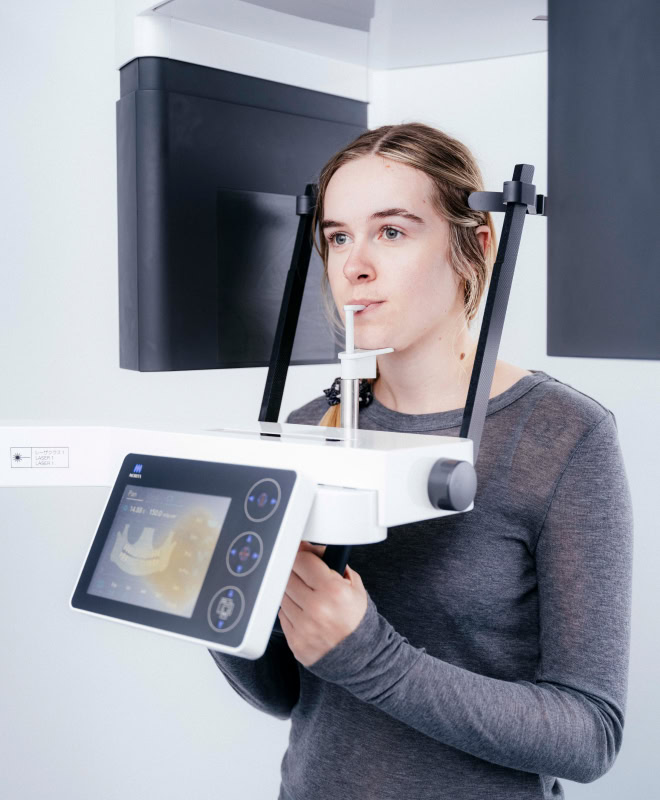

Explore the Oral
Health Benefits of
Wisdom Teeth Extraction
Removing wisdom teeth offers lasting oral health benefits. It helps reduce the risk of pain, infection, and misalignment, supporting a healthy smile. This procedure promotes improved dental function and comfort while preventing possible complications.
- Removing third molar teeth eliminates pain caused by impacted or partially erupted teeth, providing immediate relief and improving daily comfort.
- Extraction prevents infections and tooth decay by addressing areas that are difficult to clean, reducing the likelihood of gum disease.
- It addresses crowding issues, helping nearby teeth maintain proper alignment and reducing unnecessary wear.
- Wisdom teeth removal lowers the risk of complications, such as cysts or damage to neighbouring teeth, promoting better oral health.

Experience the Difference of Gentle Care with Us
How We Can Help
Learn How Wisdom Teeth Extraction Can Address Your Dental Problem
I Have a Dental Emergency
Our Payment Options
Find What Works for Your Financial Needs With Our Dental Payment Options
Child Dental Benefits Schedule
Invest in your child's smile with the Child Dental Benefits Schedule (CDBS). This government program offers eligible families financial support for essential dental services, promoting good oral health habits from an early age.
The CDBS covers up to $1,095 over two years for basic dental care like check-ups, cleanings, and fillings for children aged zero to 17. Eligibility depends on Medicare status and specific government payments, making quality dental care more accessible to families.
Learn MoreDental Services for DVA Card Holders
Veterans deserve high-quality dental care, and the Department of Veterans' Affairs (DVA) program delivers just that. The program offers dental benefits that vary based on card type.
Gold Card holders receive comprehensive cover for clinically necessary treatments, from routine check-ups to advanced procedures. White Card holders are covered for dental care related to accepted service-related conditions or mental health needs. Our clinic proudly supports veterans by providing high-quality dental care to maintain their overall health.
Learn MoreHumm
Simplify your dental care payments with Humm, a flexible financing option that lets you smile now and pay later. This interest-free payment plan allows you to spread the cost of your dental treatments over time, making essential care more accessible.
Humm is available for various dental services, from routine check-ups to more complex procedures. With instant approval and the ability to manage your account online, Humm helps you prioritise your oral health without financial stress.
Learn MoreZip
We offer Zip to help patients manage treatment costs. With credit limits between $1,000 and $50,000, eligible patients can select flexible repayment terms from three to 60 months, making it easier to manage costs.
Zip is ideal for anyone needing dental care without upfront costs. The user-friendly app allows you to track payments easily, so you can stay on budget while prioritising your oral health.
Learn MoreSuperCare
With the help of SuperCare, eligible patients can release their superannuation funds early to access essential dental procedures. This option is suitable for families lacking sufficient health funds or available resources, covering services such as orthodontics, implants, and root canal therapies.
SuperCare's consultants guide you through the straightforward application process, simplifying what can often be complex. This service enables you to prioritise your family's oral health without the burden of upfront costs.
Learn MoreAfterPay
Experience the convenience of dental care with Afterpay, allowing you to receive treatments now and pay later in four easy instalments over six weeks. This payment option is available to anyone over 18, a practical choice for adults looking to enhance and maintain oral health.
With no interest charges when payments are made on time, Afterpay promotes responsible budgeting. Payments are automatically deducted from your linked debit or credit card for a smooth experience.
Learn MoreBupa Preferred Provider
Enjoy exclusive benefits and hassle-free claims when you choose our clinic, a Bupa Preferred Provider, for your dental health needs. Our patients can access a comprehensive range of services, including check-ups and major procedures, often at reduced out-of-pocket costs.
Members First Ultimate also offers 100% back on two dental check-ups and cleans every six months, making regular oral care more affordable. Our partnership with Bupa allows you to receive quality care while maximising your benefits.
Learn MoreHCF Preferred Provider
Experience affordable, high-quality dental care at Redlands Gentle Dental Care. As an HCF preferred provider, patients with eligible dental cover can access reduced out-of-pocket costs, no-gap services for selected treatments, and streamlined claims processing.
HCF members can take advantage of these benefits by choosing our clinic for their dental needs. Check your policy to understand covered treatments and annual limits, and let us help you achieve a healthier, brighter smile.
Learn Morenib Preferred Provider
Access professional dental care at our clinic, a trusted part of nib's First Choice network. As a nib Preferred Provider, we offer members the opportunity to receive quality dental care at agreed rates. This provides a transparent and straightforward experience for your dental needs.
Nib members benefit from reduced out-of-pocket costs and simplified claims processes at our clinic. To make the most of your cover, review your policy for applicable limits and service inclusions.
Learn MoreWisdom Teeth Extraction Insights
Frequently Asked Questions
How many days does it take to recover from wisdom teeth removal?
Most people recover from wisdom teeth removal within a week, with significant improvement in swelling and discomfort during this period. You may feel well enough to return to light activities within a few days. However, the internal healing process takes longer, with full recovery of the gum and bone tissue requiring several weeks. Here’s what you can expect during wisdom teeth surgery recovery:
- First 24 Hours:
A blood clot forms in the surgical sites to begin the healing process. It’s important to avoid dislodging it by refraining from activities like using straws, spitting, or vigorous rinsing. - 2–5 Days:
Swelling in the cheeks and mouth commonly peaks and then starts to subside. You may still experience mild discomfort, but this is normal and can be managed with over-the-counter or prescribed pain relief. - 7 Days:
If non-dissolvable stitches were used, your dentist will remove them during a follow-up dental appointment. Most patients experience a reduction in soreness within this time. They can begin resuming normal oral care if the healing sites are not disturbed. - 7–10 Days:
Jaw stiffness and soreness should improve significantly, helping you eat more foods and speak with more comfort and ease. Following dentist instructions is crucial for smooth wisdom teeth extraction recovery, promoting full healing, and minimising the risk of complications. - 2-3 Weeks:
Any minor bruising on the face or discolouration from the dental procedure should heal fully, and most patients feel completely recovered. However, the internal healing of the sockets may continue for a few more weeks.
After these milestones, your recovery following the removal of wisdom teeth can be smooth if you adhere to your dentist’s aftercare guidance. A focus on rest, proper oral hygiene, and a soft food diet can support a successful wisdom teeth extraction recovery. If you notice prolonged intense pain or unusual symptoms, contact your dentist for further evaluation.
How long does it take for wisdom teeth removal wounds to close?
The wounds left after wisdom tooth surgery are known as extraction sites. They usually begin to close within 7 to 14 days as the gum tissue gradually grows to cover the sockets. However, full closure of the holes, including the underlying bone healing, can take several weeks to months. The exact timeline depends on factors such as the size of the surgical site and individual healing rates. The proximity to other teeth also influences it.
During the initial stages, proper aftercare is essential to protect the healing area and avoid complications like dry sockets. Healing after the removal of upper wisdom teeth is often quicker than lower ones. This is because the upper jawbone is less dense, which makes recovery smoother. Following good aftercare practices is vital for successful wisdom teeth extraction recovery.
When is a dry socket no longer a risk?
A dry socket is typically no longer a risk about 7 to 10 days after wisdom teeth removal. During this time, the blood clot in the surgical site stabilises and begins to be replaced by healing gum tissue. Proper aftercare is crucial during the first week to protect the clot and avoid complications. Activities such as using straws, smoking, or vigorous rinsing should be avoided.
Most patients no longer worry about dry sockets once healing progresses. However, monitor your recovery closely for symptoms like severe pain, bad breath, or an empty socket. If you suspect complications, consult your dentist immediately.
What should I avoid doing after getting my wisdom teeth out?
To promote proper healing and minimise complications after wisdom teeth extraction, here are key things you should avoid:
- Using Straws:
The suction can dislodge the blood clot from the socket, increasing the risk of a dry socket. It may also cause potential damage to the healing site. - Smoking or Vaping:
Both can interfere with healing and increase the risk of dry sockets due to suction and exposure to harmful chemicals. These habits can also contribute to long-term oral health issues. - Vigorous Rinsing or Spitting:
These actions can disturb the blood clot and delay healing. Instead, rinse your mouth gently and allow the water or salt water solution to flow out your mouth instead of spitting forcefully. - Eating Hard, Chewy, or Crunchy Foods:
Foods like nuts, chips, or sticky candies can irritate the treatment area or get stuck in the socket. This disruption may interfere with your recovery. Instead, opt for a soft diet after wisdom teeth removal. - Touching the Extraction Site:
Avoid using your tongue, fingers, or any objects to poke or press the area. Doing it can introduce bacteria or dislodge the blood clot, potentially causing heavy bleeding or localised infection. - Strenuous Physical Activity:
Intense exercise or heavy lifting can increase blood flow and potentially cause excessive bleeding in the surgical area, delaying recovery. - Drinking Alcohol:
Alcohol can irritate the healing tissues and may interact with prescribed medications, slowing recovery and increasing the risk of complications.
Following these guidelines and your dentist’s specific aftercare instructions will help you make a smooth wisdom teeth extraction recovery. If you have questions or notice unusual symptoms, such as intense pain or swelling, consult your dentist promptly. Signs of oral health issues should also be addressed without delay.
How long after wisdom teeth extraction can I eat?
You can begin eating soft foods within a few hours after your wisdom teeth removal. First, make sure the anaesthetic has completely worn off. Stick to soft foods like yoghurt, mashed potatoes, smoothies, or soup at a lukewarm temperature to avoid irritating the treatment area. Refrain from chewy foods during the first few days after your tooth extraction. They can dislodge the blood clot or cause severe discomfort. Most people can gradually reintroduce solid foods after three to four days, depending on how their healing progresses.
At Redlands Gentle Dental Care, we guide you through every step of your recovery after the wisdom teeth removal process. This includes advice on when and how to reintroduce foods safely. Our team provides postoperative care instructions tailored to your needs. These guidelines help you understand which foods to eat and avoid during the crucial healing period. If you have concerns about pain while eating or your recovery progress, we are here to help. Our professional support and aftercare are designed to promote your healing and well-being.
What are the foods I can eat during wisdom teeth extraction recovery?
During your recovery, it’s important to eat foods that are soft, nutritious, and gentle on the healing areas. Here are some great options to include in your diet after wisdom teeth removal:
- Mashed Potatoes:
These are soft, easy to eat, and can be flavoured with mild seasonings for variety. They provide a satisfying meal without causing strain on the surgical site. - Yoghurt:
Plain or low-sugar yoghurt is smooth, nutrient-rich, and gentle on the gums. It’s a great way to maintain energy levels while avoiding harder foods that could irritate the healing area. - Smoothies: Blended smoothies are packed with nutrients and are easy to consume, making them ideal during recovery. However, avoid using a straw to drink them, as the suction could dislodge the blood clot and slow healing.
- Scrambled Eggs:
Soft and rich in protein, scrambled eggs are a nutrient-dense option for recovery. - Soups and Broths:
Warm soups, especially creamy or blended ones, can provide hydration and nutrients without the risk of irritating the surgical site. Avoid soups with chunks of hard vegetables or meat. - Applesauce or Pureed Fruits:
These provide a soft, nutritious way to enjoy fruit during recovery. They are easy to swallow and gentle on sensitive gums. - Oatmeal or Cream of Wheat:
After a few days, these soft grains can be added to provide variety and energy in your recovery meals. Make sure they are well-cooked and lukewarm before eating.
As healing progresses, gradually reintroduce solid foods into your diet after wisdom teeth removal, following your dentist’s guidance. Avoid crunchy, hard, hot, or spicy foods until your extraction sites have healed. These foods can disrupt healing or cause discomfort.
Do dentists put patients to sleep for wisdom teeth removal?
Dentists do not always put patients to sleep for wisdom teeth removal. For straightforward cases, a local anaesthetic is used and numbs the area, keeping you awake and comfortable during the dental treatment. If you feel severely anxious, mild sedation options may be provided. These techniques can help you stay calm and at ease. They are especially useful for patients who experience dental anxiety or for those who require more complex extractions, such as impacted wisdom teeth.
At Redlands Gentle Dental Care, we prioritise your comfort and well-being during the wisdom tooth extraction process. Our team will discuss all available options, including nitrous oxide and IV sedation. If you have any concerns or questions about the process, we’re here to guide you. Our goal is to make your experience smooth and comfortable.
How much does it cost to remove a wisdom tooth, and do health funds cover the procedure?
The cost of wisdom teeth removal varies based on the complexity of the procedure and whether it involves nitrous oxide or IV sedation. Simple extractions generally cost $150 to $400 per tooth. However, more complex cases—such as impacted wisdom teeth that require surgical extraction—can range between $450 and $1,180 per tooth. For patients needing all four wisdom teeth removed, the total cost can range from $1,000 to $3,000. This depends on the procedure and additional fees, such as consultations or dental X-rays.
Health funds may cover part of the wisdom tooth extraction cost, but this depends on your policy and level of scope. Most plans with hospital or extra cover provide dental surgery benefits, significantly lowering out-of-pocket costs. At Redlands Gentle Dental Care, we encourage patients to check with their health fund provider to confirm what is covered. We also recommend discussing costs during the initial consultation for more clarity. Our friendly team is happy to provide itemised quotes and assist with processing claims to make dental services as affordable as possible.
